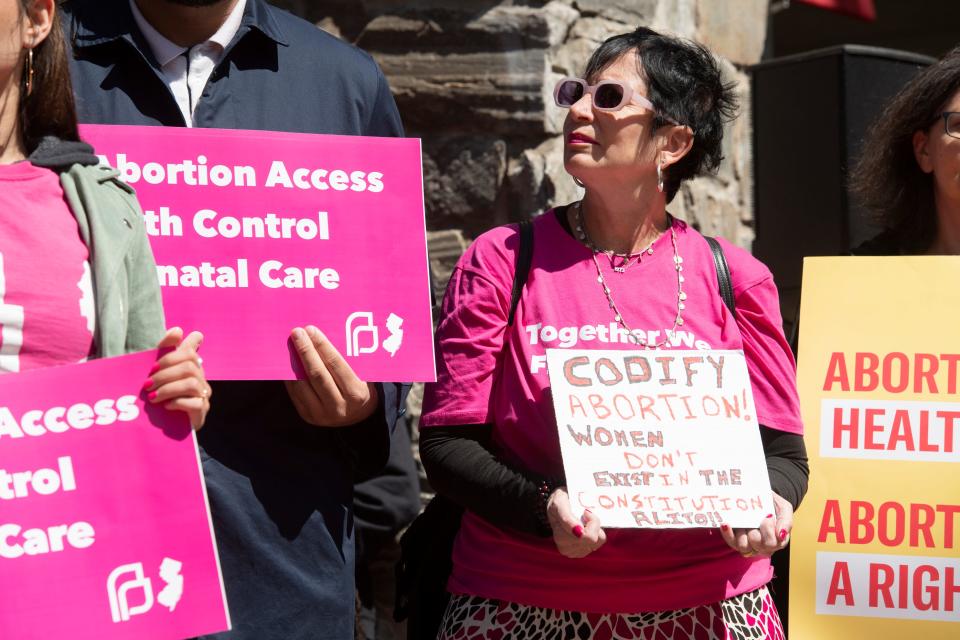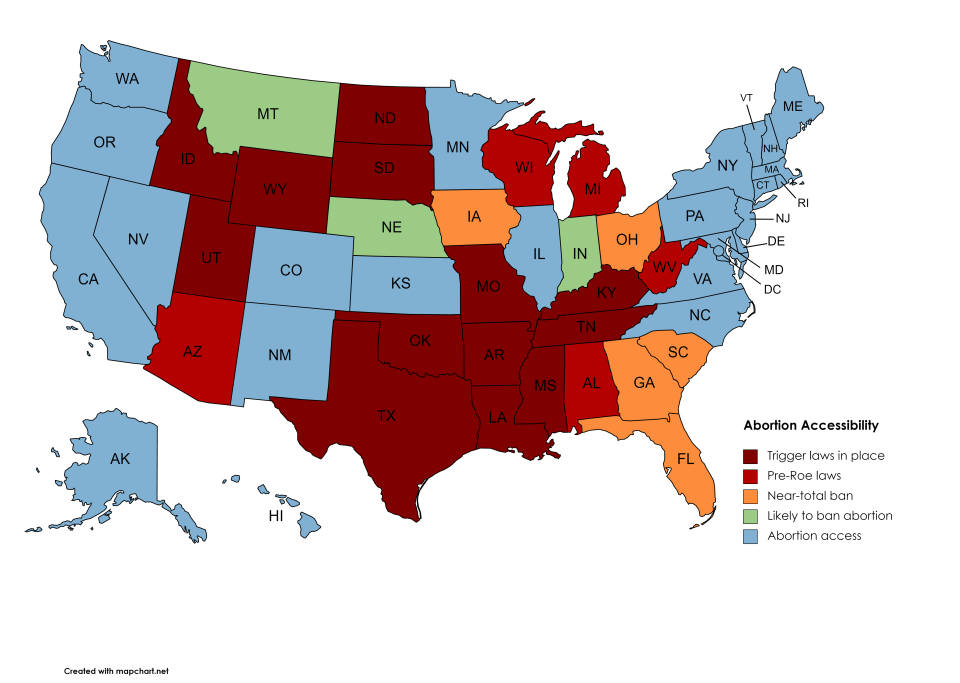In a post-Roe era, the internet could help or hurt women seeking abortions. Here's how.
When abortion was illegal, some people turned to clandestine clinics that they learned about via word of mouth to undergo risky procedures to end a pregnancy. Others tried self-abortions, including the coat-hanger method, which became a symbol of the desperate measures at the time.
Today, after the Supreme Court decision in Dobbs v. Jackson Women’s Health Organization to overturn Roe v. Wade, Americans are bracing for bans to be enacted in at least half of the states. But the landscape for underground abortion will be vastly different in a digital era.
“Online information will become a great resource even more heavily than it is today as states ban abortion," said Corey Basch, a professor of public health and the department chair at William Paterson University, noting that even before the decision there was a spike in searches.

But there are potential risks. States may try to prosecute people who cross state lines to undergo an abortion. They may do the same for those who help them. Social media and other online platforms could promote false or conflicting medical and legal advice. And experts warn that digital records can be tracked to catch and prosecute people who break abortion laws.
Live Updates: Scenes from New Jersey after Supreme Court strikes down Roe vs. Wade
More: Supreme Court decision to overturn Roe v. Wade will not change abortion access in NJ
In a politically charged environment, conspiracy theories already are bubbling online about the court’s abortion ruling, including who was behind the leak and why. Misinformation about laws and procedures are likely to grow in a post-Roe v. Wade environment, Basch said.
Online activism
Emboldened by news of a Supreme Court ruling, conservative lawmakers passed a flurry of anti-abortion measures. At least 26 states are likely to move quickly, according to the Guttmacher Institute. They include 13 states with "trigger laws" that would take effect immediately or as soon as possible to ban abortion.
Pro-choice nonprofits and private groups have been mobilizing to connect people with abortion services and help to pay for travel and medical costs. Some websites show users the nearest abortion clinics or connect people with online health care visits and abortion pills.
Abortions are available with an FDA-approved pill mailed to one’s home and a telehealth visit during the first 10 weeks of pregnancy. But states are expected to ban both clinical and medication abortions; some already ban telehealth, or online medical care, for abortion.
More: How NJ groups will support abortion rights following the overturning of Roe v. Wade
Casey Olesko, communications director of Planned Parenthood Action Fund of New Jersey, said women facing “unjust laws,” abortion stigma and economic inequities can find guidance on the Planned Parenthood websites.
"Everyone should have access to safe, effective, and legal abortion, without stigma or barriers," she said.

‘Everything is traceable’
A team of researchers from the Informed Consent Project at Rutgers University examined state-sanctioned information given to people about abortions. They found one-third of the information was medically inaccurate, in some cases including false claims about ties to breast cancer, infertility and death.
That kind of misinformation is likely to spread even further online, said Cynthia Daniels, director of the Informed Consent Project and professor of political science.
People "are going to seek out information on the internet without any possibility, often, of seeing a medical provider that can give the correct information,” she said. “That’s very frightening and will also lead women to engage in self-abortion practice, which can be risky without proper medical supervision.”
Since the Roe v. Wade leak, posts have already been spreading on social media about do-it-yourself abortion methods. They include recommendations of herbal concoctions, vitamin C or toxic substances to end a pregnancy.
A self-described biohacking group that purports to teach people to make medicine on their own also re-shared a 2019 video on how to make at-home abortion pills just like the ones sold by pharmaceutical companies.
But there are also reproductive health networks offering accurate medical guidance and access to abortion pills, Daniels noted.
While abortion services might be easier to find in a digital era, they will also be easier to track.
More: Abortion providers in NJ worry they will face more protests after Supreme Court ruling
Companies already collect wide-ranging information online about people’s travel, web search history, messages and purchases. These kinds of records could be sold for use against abortion clients and providers, technology experts and federal lawmakers have warned.
Location data companies SafeGraph and Placer collected and sold information about people who visited Planned Parenthood clinics using cellphone data, a VICE investigation found.
The situation underscored an urgent need for data privacy laws, Democratic lawmakers said. Last month, 16 Democratic senators including New Jersey Sen. Cory Booker wrote to the Federal Trade Commission urging the agency to protect privacy of people seeking abortions.
Basch said medical professionals were on guard about digital record-keeping that could impact them and their clients. Some are considering transferring to a paper record system for reproductive treatment and switching to encrypted messaging.
People seeking abortions are advising one another to switch to European-owned apps where there are strong laws protecting data privacy.
“There’s a lot of fear that state prosecutors would participate in data surveillance, not only typical digital evidence but also search history and emails,” Basch said. “People are voicing concerns about using apps and different social media.”
Technology companies, she said, should clarify policies and practices on data sharing, she said.
“I do think when people mobilize it will be an incredible movement," Basch said. “Then there’s the flipside. Everything today is traceable. And I don’t think this generation is necessarily ready for that.”
Hannan Adely is a diversity reporter covering Arab and Muslim communities for NorthJersey.com, where she focuses on social issues, politics, bias and civil rights. To get unlimited access to the latest news, please subscribe or activate your digital account today.
Email: adely@northjersey.com
Twitter: @adelyreporter
This article originally appeared on NorthJersey.com: Roe v. Wade: Could the internet help or hurt women seeking abortions?

